- Home
- Lisa Gardner
The Guy Who Died Twice Page 2
The Guy Who Died Twice Read online
Page 2
“Your patient’s murder?” D.D. offered helpfully.
The doctor glowered at her. “And Martha . . . Mrs. LaToile’s express permission . . .”
Mrs. LaToile nodded. At her request, the doctor had joined them in the sitting room. Mrs. LaToile now had one wingback, D.D. the other, with the doctor sitting on the small, elegantly striped love seat in between. Dr. Anil spoke with a fine French accent. He was a smaller man, nut-brown skin, thinning dark hair, but with the kind of rigid posture and custom suit that demanded respect. D.D. pegged his shoes at a thousand bucks. She wondered how much of his wardrobe the LaToiles were personally responsible for, or if he had a bevy of similarly wealthy clients.
“As you may have heard, Mr. LaToile had a long history of depression. I have personally been treating him for the past fifteen years. Like many sufferers of acute depression, there are times when Adam seemed to be making great strides. Would have stretches for a few months, even a year, when his mood improved and stabilized. When it appeared he was winning the war against his own genetic past.”
Mrs. LaToile smiled sadly, still fidgeting with her scarf. “Oh, those times were wonderful. During one of them, Adam ordered construction of the back patio. He knew roses were my favorite and wanted me to start each morning surrounded by their scent.”
D.D. nodded, though she was hardly the stop-and-smell-the-roses type.
“Unfortunately, like many sufferers of acute depression, Adam would inevitably experience a setback,” Dr. Anil continued. “I would work on adjusting his medications, increase his one-on-one sessions. But inevitably depression is depression. And given the family history—an institutionalized parent, a sibling who’d committed suicide, a tragically deceased child—Adam had many strikes against him.”
“What does this have to do with him thinking he’s dead?” D.D. asked.
“It proves my point. It’s called Cotard’s syndrome, and it’s a severe form of depression. So severe, the sufferer genuinely believes he or she is dead.”
D.D. blinked several times. “Seriously? Mr. LaToile was so depressed, he didn’t just think he was better off dead, he thought he was dead?”
“It’s very rare—”
“Has he had such episodes before?”
D.D. looked askance at Mrs. LaToile, who shook her head.
“I’ve been increasingly worried about it, though,” Dr. Anil chimed in. “Cotard’s is most likely to appear in families with a long history of depression, which we know Adam fits. From a neurological perspective, two things happen at once. First, there is a decrease in activity in the area of the brain responsible for the subject’s sense of the external world—the five senses. Weeks ago, Adam started talking about colors seeming flat to him. In one of our sessions, he reported to me that he thought the maid had swapped out all of his clothes in the middle of the night—none of his shirts or pants felt right.”
“He tried to fire Chef,” Mrs. LaToile whispered. “He accused the man of no longer knowing how to cook. Or purposefully holding back spices from our dinner.”
“He stopped bathing, brushing his teeth,” Dr. Anil prodded gently.
Mrs. LaToile nodded. “He said he didn’t want to waste water on himself. He didn’t need it. I would wait until he was asleep at night, then sponge him down.”
Dr. Anil nodded. “In hindsight, this is all evidence of the first criterion of Cotard’s. The world no longer feels real to him. Starting him down the path of wondering if he is dead, because surely a living person would taste food, recognize color, enjoy the feel of soap on his skin.”
D.D. still wasn’t sure she got it, but she nodded. “And the second part of Cotard’s?”
“The person also loses their sense of self. He or she may suffer from any number of delusions. Hence, you can’t talk them out of their conviction of their own deadness.”
“One of my detectives gave Mr. LaToile water at the HQ,” D.D. provided slowly. “He tried to tell Mr. LaToile that because he was drinking the water, he couldn’t be dead. But Mr. LaToile wasn’t buying it.”
“Exactly. Adam first lost his ability to perceive the external world, then lost the ability to perceive himself. You’re telling him he’s drinking water, but he doesn’t feel like he’s drinking water, further evidence he must be dead. Most sufferers from Cotard’s will also express guilt and self-loathing.”
“He kept telling us not to look at him, that he was contagious,” D.D. said.
“Did he claim responsibility for the ills of the world? Genocide, the AIDS epidemic, instability in the Middle East? The delusions are many and varied and generally offer some insight into the individual’s specific suffering.”
D.D. started to shake her head, then caught herself. “He talked about some society of good. They must have killed him, to save others.”
“Extreme guilt, the world would be better off without him.” The doctor nodded. “More classic evidence of despair.”
“He tried to strangle his wife,” D.D. offered, because Mrs. LaToile wasn’t saying much.
“He didn’t mean it,” she chimed in immediately. “He was just”—she looked at the doctor—“having one of his episodes.”
“He harmed you, hoping you would harm him,” the doctor provided gently.
“Yes,” she whispered.
“But you didn’t. Because you loved him.”
“Yes.”
“Which, ironically enough, was probably the proverbial straw that broke the camel’s back. He did love you, Martha. He hurt you, and you forgave him. The level of self-loathing he must have experienced, along with the rest of his mental deterioration . . .”
“He woke up in the morning and told me he was dead,” Mrs. LaToile murmured.
“And not even because he wished he was, but because by then, his own brain told him he was. Which is why”—Dr. Anil glanced at D.D.—“you can’t reason with someone suffering from Cotard’s. There’s no way to get them to see, you’re talking, ergo you must be alive. You’re walking, ergo you must be alive. The sufferer genuinely considers himself dead. And it’s not purely a delusion. The message is coming straight from the neurons of the brain, which are no long firing properly. Descartes was famous for saying, ‘I think, therefore I am.’ From a neurological perspective, Cotard’s is an exercise in ‘I think, therefore I’m dead.’
D.D. honestly didn’t know what to say. “Is there a treatment?”
“Best results are achieved with electroconvulsive therapy, ECT. It sounds barbaric, but if you consider the brain is a highly complex computer, then part of the system has failed. The regions on the outer side of the frontal and parietal lobes must literally be shocked back to life. Followed, of course, by a regimen of antipsychotic drugs to treat the delusions, and antidepressants to mitigate the despair.”
“We found those kinds of prescriptions on Mr. LaToile’s nightstand,” D.D said.
Dr. Anil waved a hand. “As I said, I was already beginning to have concerns for Mr. LaToile’s state of mind. I only wish the drugs had worked before things became this hopeless.”
“Could he have been successfully treated?” D.D. pushed.
“Absolutely. There is a private hospital in Brussels that has had much success with such cases. Perhaps I should’ve moved more aggressively on the subject, but ironically enough, without Mr. LaToile declaring himself dead, he didn’t meet the requirements of the condition.”
“He thought himself alive,” D.D. muttered, “until just before he really was dead. Which brings us to today, and the knife in his back.” She regarded the doctor frankly. “I imagine sufferers of Cotard’s present a serious suicide risk.”
“Why? They already think they’re dead,” the doctor deadpanned.
Which brought D.D. to her next problem: a knife between the shoulder blades was hardly an act of self-harm, but murder, plain and simple.
“How many people are in the home today?” she asked Mrs. LaToile.
The woman had to think about it. “Paulette, Ernesto, Manuel, Charlie, Dennis.”
“Yourself.”
“Myself.”
“Dr. Anil.”
“I stopped by only briefly, and left once Adam was safely tucked into bed,” the doctor countered.
“You have a security system, cameras?” D.D. asked the wife. “Anything monitoring both the front and back entrances of the house to help track comings and goings?”
Mrs. LaToile’s eyes widened. She shook her head.
“So Dr. Anil might have returned,” D.D. suggested blandly.
The doctor frowned at her. “As well as others.”
“We would know,” Mrs. LaToile spoke up stiffly. “There might not be security cameras, but between myself, Paulette, and Manuel all in the house, Dennis in the kitchen, Charlie and Ernesto floating around the grounds, the residence is hardly empty. If someone else was about, we would have known it.”
“Meaning you are now my prime suspects. All of you, each of you, had the opportunity to harm Mr. LaToile as he slept.”
“But why would we? We loved him. Everyone loved him!”
“Why indeed?” D.D. murmured, and turned once more to Dr. Anil.
Back at home on the sofa . . .
“So what, you brought the entire household down to HQ?” Alex asked, taking a sip of wine.
“Could’ve. But there’s something to be said for questioning suspects in their natural habitat.”
“You mean a household with excellent homemade shortbread?” Alex asked sagely.
“I’ve never drank so much tea in my life. It all felt very Agatha Christie.”
“So what did you do first?”
“Determined where each member of the household was during the hours leading up to the discovery of Adam LaToile’s body and could anyone alibi anyone else during the general time of the murder.”
“Which brought you to?”
D.D. shook her head. “Big house. Chef Dennis was in the kitchen prepping dinner. Maid Paulette was cleaning the upstairs sitting room. Gardener Ernesto was trimming bushes in the back. Manservant Manuel was getting down trunks in the attic, and driver Charlie was polishing the trim on the Rolls. While Martha was in her private study, looking at her calendar. Basically, everyone was around, but no one was in one another’s company. Meaning any one of them could’ve done it.”
Six hours earlier . . .
“Okay, this is what I got,” Phil said as he convened with D.D. in the upstairs hallway. The ME, Ben Whitley, had arrived and was now in the bedroom, studying the body, while Carol waited. Neil had volunteered to start questioning the household staff. It was either that or hang out with his ex, the medical examiner. While the split was years ago and amicable, D.D. didn’t blame her detective for wanting a little less personal life on the job.
“Adam LaToile is fourth-generation wealth. Great-grandfather was heavy into banking. Made the kind of money that got him a summer ‘cottage’ in Newport, if you know what I mean.”
Like most New Englanders, D.D. had spent quality time touring the Newport, Rhode Island, mansions. She knew what Phil meant.
“Back in those days, there was a saying. First generation made the money, second generation grew it, third generation squandered it. The LaToiles seem to have mostly kept theirs. Though mostly through unfortunate circumstance. Mrs. LaToile wasn’t kidding. I can’t find a single happy branch in the family tree. Sounds like most were too depressed to do anything wild and crazy with the family fortune, and the rest either died young or were institutionalized. Mr. LaToile might have woken up this morning thinking he was dead—and, well, then got murdered during his lunchtime nap. But given that he made it to sixty-eight, he’s one of the longest-surviving family members.”
“What about his first marriage?”
“Patricia Niece. Also from an old Boston family. They were married twenty years. Had a single daughter, Leticia LaToile. She died at fifteen.”
“How?”
“Um, details on that are a bit vague. Given the family history . . .”
D.D. looked at Phil. “You think she committed suicide.”
“Cause of death is given as undetermined.” Phil shrugged. “When was the last time a young person died unexpectedly, and the system settled for ‘undetermined’?”
“The ME knew COD but left it undefined as a favor to the family.”
“This kind of money . . .”
“That kind of sadness,” D.D. murmured. Because being a parent herself, she couldn’t imagine losing Jack unexpectedly, especially to what in the case of the LaToiles could best be described as a genetic disease. “What happened to the wife?”
“She still lives in the area. I asked Charlie a few questions—”
“You were checking out the Rolls, weren’t you?”
“Hey, last known location of the deceased.”
D.D. rolled her eyes. Then again, given she’d already eaten three shortbread cookies and her next stop would probably be in the kitchen for a fourth . . .
“Charlie’s been driving around Mr. LaToile for twenty-five years. According to him, he’s the longest-serving staff member. Plus, you spend that much time in a car with a person . . .”
“All right, what does Charlie have to say?”
“Divorce between Adam and his first wife was beyond cordial. There was a prenup in place, protecting both sides, being a marriage of old money squared. Adam still gave the first Mrs. LaToile anything and everything. Except for this house, which he was required to keep, being the family estate. But anything else, she just had to name it and it was hers. Guilt and sadness. Those are the two words that best describe Mr. LaToile’s life. And after the loss of their daughter, the first Mrs. LaToile wasn’t doing much better. According to Charlie, they were both just done. Adam forked over all the art, and a lot of the family jewels, half a dozen bank accounts, and that was that. Charlie hasn’t even seen the first Mrs. LaToile since.”
“How’d Adam meet the second Mrs. LaToile?”
“Bridge club.”
“Seriously?”
“Seriously. Bet they were having tea and crumpets, too.”
“I need a new life,” D.D. said.
“Me, too. Though I’d still keep my wife. The four kids, on the other hand . . .”
D.D. shook her head. Phil was a hopeless family man and he knew it.
“Does this Mrs. LaToile come from money, too?” D.D. asked.
“Nope. Self-made. Selling real estate.”
“No kidding? Because this house, which is now going to her, has gotta be one of the largest properties on the Boston market, yes?”
“Charlie claims they adored one another. Mrs. LaToile went out of her way to accommodate Adam and his ‘moods’ and has been really good for him.”
“Strangling episodes aside?” D.D. asked drolly.
Phil shrugged. “Adam was a bachelor for nearly eight years before he met Martha. According to Charlie, it wasn’t a good eight years. Mr. LaToile required a full-time live-in nurse, daily therapy sessions, and still barely got out of bed most days. Sometime in there Dr. Anil appeared; Charlie can’t really remember. It was during one of Adam’s ‘upswings’ that he met Martha. With her support, he started making progress again. Three years ago, they were able to let go of the nurse and hired Paulette as a live-in maid instead. Year after that, Martha found Dennis, the personal chef. He has them both on some antioxidant-this, brain-food-that diet to help boost serotonin and God knows what else to improve Adam’s mental state. Unfortunately, the past six months Adam’s moods seem to have deteriorated again. The nature of the beast, according to Charlie. But he has only good things to say about Mrs. LaToile and the marriage. Charlie has never even seen them fight.”
“T
hen he missed a good show last night.”
“Mr. LaToile trying to strangle Mrs. LaToile?”
“Charlie knew about that?”
“Manuel had already told him. Servants. They love to gossip.”
“I wouldn’t know,” D.D. assured him.
“Charlie’s impression was that it wasn’t much of an attack. An ‘episode’ is the word he kept using. Mr. LaToile had had them before. Afterwards he was always broken up, repentant, et cetera.”
“Lot of wife beaters are.”
“I don’t think you can make that comparison,” Phil told her, his tone serious. “To talk to the household staff, sounds like there wasn’t a mean bone in Adam LaToile’s body. He wasn’t aggressive. He was sick.”
“Which brings us to Dr. Anil, who may or may not have been home when Adam was stabbed.”
Phil smiled. “I can tell you this: According to his receptionist, Dr. Anil didn’t return to his office after seeing Mr. LaToile. And Charlie saw him out front, shortly after noon.”
“He doesn’t have an alibi.”
“Nope. None of them do.”
Back at home on the sofa . . .
“My money is still on the wife,” Alex said. He untucked long enough to top off his wine. “Let’s face it. It’s generally the wife.”
“I think you mean spouse.”
“Whatever.”
“Well, given the value of that house, and that apparently it had to stay in the family . . . As the widow, Mrs. LaToile would be in a position to inherit. Divorce, however, wouldn’t yield that particular treasure.”
“Always gotta look out for the wife,” Alex stated firmly. “Plus, I understand Phil’s point: Sounds like Adam LaToile wasn’t an evil guy; he just suffered from mental illness. Having said that, doesn’t mean it made the abuse any easier for Mrs. LaToile to take. Her own husband violently attacked her just the night before, which wasn’t the first time, just one of the worst. I could see Mrs. LaToile getting tired of that arrangement.”
“Though why didn’t she stab him then, when she could’ve argued self-defense?”

 Find Her
Find Her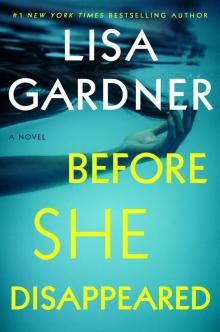 Before She Disappeared
Before She Disappeared One Step Too Far
One Step Too Far When You See Me
When You See Me Never Tell
Never Tell Touch & Go
Touch & Go The Survivors Club
The Survivors Club MacNamara's Woman
MacNamara's Woman Love You More: A Novel
Love You More: A Novel Gone
Gone The Perfect Husband
The Perfect Husband Maggie's Man: A Family Secrets
Maggie's Man: A Family Secrets The 7th Month
The 7th Month The Neighbor
The Neighbor Hide
Hide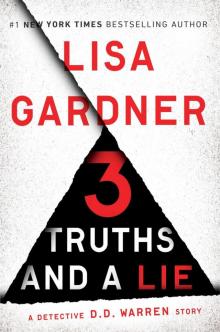 3 Truths and a Lie
3 Truths and a Lie Catch Me
Catch Me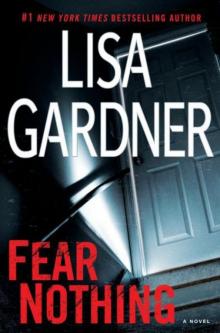 Fear Nothing: A Detective
Fear Nothing: A Detective Right Behind You
Right Behind You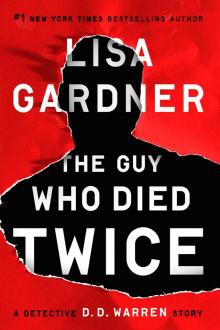 The Guy Who Died Twice
The Guy Who Died Twice Live to Tell: A Detective D.D. Warren Novel
Live to Tell: A Detective D.D. Warren Novel Live to Tell
Live to Tell Maggie's Man: A Family Secrets Novel
Maggie's Man: A Family Secrets Novel The Other Daughter
The Other Daughter Alone
Alone Crash & Burn
Crash & Burn The Detective D. D. Warren Series 5-Book Bundle
The Detective D. D. Warren Series 5-Book Bundle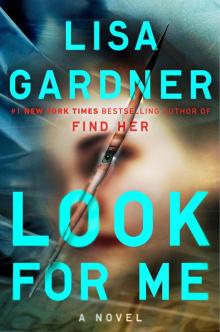 Look for Me
Look for Me Love You More
Love You More The FBI Profiler Series 6-Book Bundle
The FBI Profiler Series 6-Book Bundle The Third Victim (Quincy / Rainie)
The Third Victim (Quincy / Rainie) Say Goodbye
Say Goodbye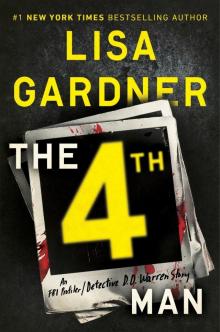 The 4th Man
The 4th Man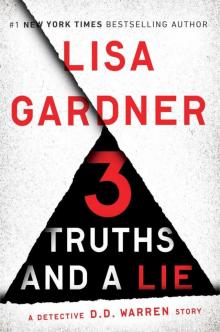 3 Truths and a Lie: A Detective D. D. Warren Story (Kindle Single)
3 Truths and a Lie: A Detective D. D. Warren Story (Kindle Single) Brandon's Bride
Brandon's Bride